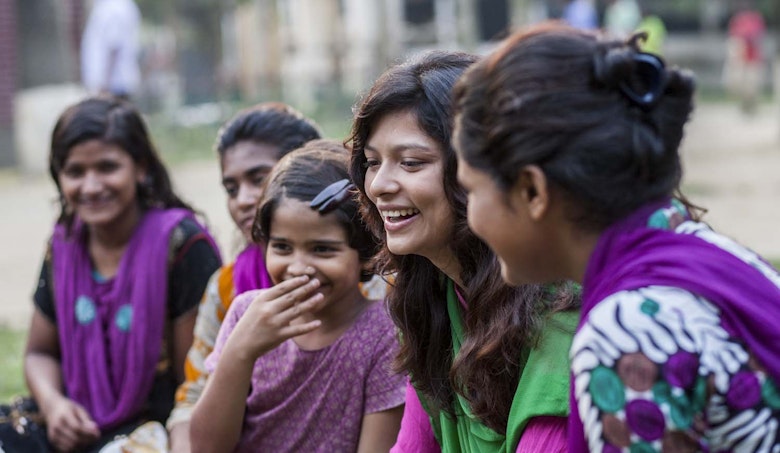How the young Sonia acquired the skills to succeed
When her father died of tuberculosis in 2019, 15-year-old Sonia was forced to leave school even though she was good at science and maths. Her mother and older siblings then married her off to a 21-year-old from the same village.
“I was frequently neglected by my elder brothers when my father died. Even my elder two sisters suggested to my mother and my brothers to marry me at an early age. Losing all patience, I got married. At my in-law's house, my position is on the same ladder,” said Sonia.
Afterwards, she and her husband had to leave the village to seek better opportunities. They moved from Shalgram Village in the Ghoraghat Upazila of Dinajpur district, to Ulaul in the Savar Upazila of the Dhaka district. Sonia’s husband first started working at an informal shoe factory, and later at the formal factory Al-Muslim Group as a laundry man, where he earned a monthly wage of 7500 BDT (76 euros).
They lived in a small rented room in a slum; in an area where most people are employed in the informal sector as garment workers and day labourers (meaning they are hired and paid on a daily basis, with no promise of work in the future). They spent 4000 BDT on rent each month, which meant they did not have enough left to meet the rest of their needs.
In order to support her husband, Sonia tried to get a job at a garment factory. However, they would ask her specific questions about sewing that she did not know the answer to, as she had never done it before. She then started working at an embroidery shop where she was unfortunately exploited: she had no contract, received no pay, and was given only a mid-day meal throughout 12-hour shifts. During this time, she longed to learn the necessary skills to get a better job in the garment industry.
“I tried to seek skills to get a job in the garment factories but I couldn’t do anything because I failed to manage one [a sewing machine]. Even in front of garment factories, I was asked questions related to process-based knowledge from the employers, and I failed to answer their questions. I tried to seek skills rather than thinking I couldn’t do anything because I have no skills and academic certificate,” explained Sonia.
One day, near the Polli Garments Training Centre, Sonia met a staff member of the TVET project (Technical and Vocational Education and Training). They were advocating for TVET and employment, and Sonia became motivated to join. She communicated to the project staff how she wished to take a Sewing Machine Operator (SMO) course from Polli Garments Training Centre. After an assessment, the project staff concluded that it was the right choice to make Sonia a beneficiary of the TVET project.
The project staff also sought consent from her husband, who provided full consent “if the centre would manage to get her a job in the garment factories”. Sonia then became a community volunteer and was admitted to the Polli Garment Training Center to take the SMO course. At the Center, she learned sewing techniques and attended life skills training. She also learned about occupational safety and health, labour rights and laws, minimum wage grades (along with calculation of the basic wage and maternity benefits), and more. Sonia proved to be a quick learner, and during the course she stayed in close contact with the TVET personnel.
After the course, Sonia joined the same factory as her husband (Al-Muslim Group, a renowned garment factory that complies with the legal minimum wage of BDT 9347 per month) as a sewing machine operator. She also motivates other young people around her to join TVET, as she thinks that this project was key to her new life. She is hopeful that other vulnerable young people from marginalised families can have their aspirations fulfilled with the help of TVET.
“The TVET project made me a success. I recovered my strengths physiologically and gained the strengths enormously,” said Sonia. With Sonia’s wage, she and her husband managed to rent a modest room with an attached bath and separate kitchen. They can now make ends meet and they are saving for retirement.
“I realised that TVET can help us obtain decent jobs, which leads to a dignified life for vulnerable youngsters from marginalised families including early marriage girls like myself. I regained my dream and proved myself as an employee through the TVET project which makes me happy,” she went on. “I want to take my life forward as far as I can for myself and for my family. Now, I am not disappointed. Today, I am the kind of person that doesn’t let her dreams slip away. My learning with the TVET project inspires me to contribute to developing my society and country.”
Working in the same factory, she and her husband receive a mid-day meal and spend time together after work. They also split household chores more equally, and they intend to have a baby next year. Sonia is now a confident woman with experience: with the help of the training, she can now plan her own future.

